Does your puppy eat everything? Puppies have the desire to munch on anything, but they may end up eating some strange things. The simple explanation for this is that puppies are exploring their world using their mouths, and it is often an instinct that they outgrow. But, your puppy's desire to eat everything could lead to other problems, like blockages or poisoning—and you'll want to avoid that.
Fortunately, your puppy may outgrow this puzzling habit, and there are steps you can take to help it along.
Why Do Puppies Eat Everything?
Puppies pick up objects and explore the world with their mouths. Chewing, mouthing, and sometimes swallowing stuff is their way of finding out what's edible and (ideally) what's not. Although this behavior stems from an instinct that puppies often outgrow—especially with the help of training—it can get them into trouble, even leading to blockages or poisoning.
Eating an inappropriate object can become tempting—even irresistible—when it's flavored or scented. Common problem items include grease-covered utensils from the kitchen, milky baby bottle nipples, and used tampons or soiled diapers.
Other problem items are those that tend to smell like you, such as worn socks or slippers, so it's important to keep all such items out of your puppy's reach until it learns that they're not acceptable chow.
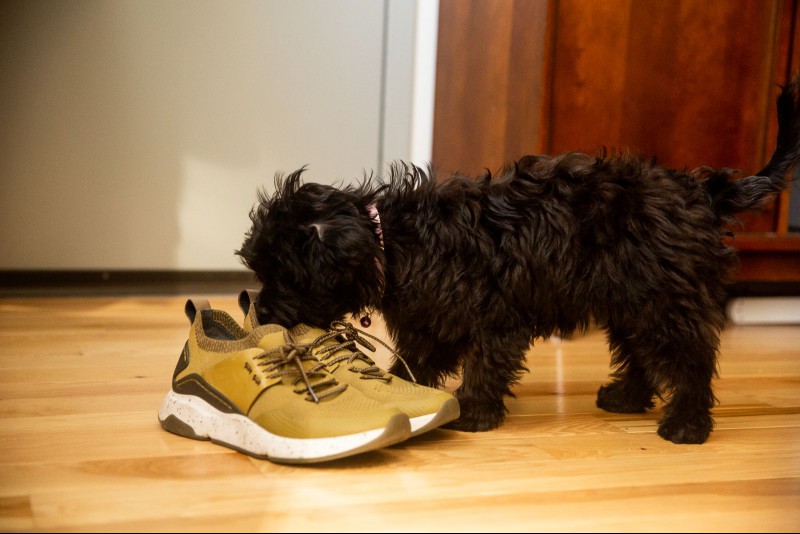
The Spruce / Phoebe Cheong
What Is Pica?
Repeatedly ingesting non-edible objects is called pica. Puppies often accidentally swallow pieces of toys, but pica refers to an almost obsessive urge to eat rocks or chomp mouthfuls of dirt, sticks, sand, or other non-digestible material. One cause is that essential nutrients are missing from an animal's diet. If you suspect your puppy is exhibiting signs of this behavior, consult your veterinarian.
Grass Grazing
Many canines occasionally eat grass, which may provide the vitamins that your puppy craves. Your pup might also simply like the taste. Occasional grazing typically isn't a cause for concern unless it develops into gnawing on poisonous plants.
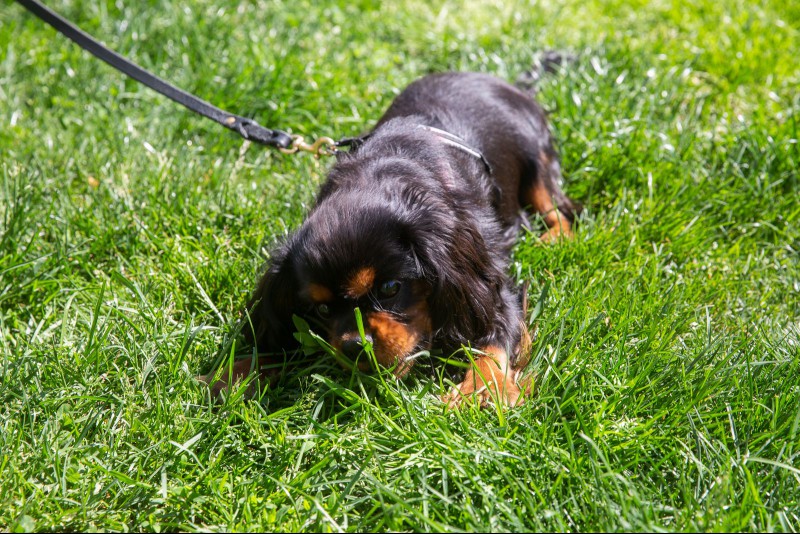
The Spruce / Phoebe Cheong
Dirt's Hidden Treasures
Some puppies seem to be drawn to different kinds of dirt or want to chew rocks. The smell may play a role in the attraction. That's particularly true if some other critter has urine marked the area. Puppies may taste the dirt to better understand what the message says.
Some dogs may prefer specific areas, such as mulch piles that may have a mushroom-like aroma or taste. Too much dirt munching can obstruct your puppy's digestive system, but an occasional taste probably won’t cause issues.
Chewing rocks, on the other hand, is a habit that should be prevented. Not only is this destructive to your puppy's teeth but it also presents a danger of choking. If your puppy is teething and has an intense desire to chew, provide him with pet-safe chew toys. Ask your veterinarian for options.
Poop Problems
People whose dogs eat feces find it to be a disgusting habit, and it's common in puppies. Pups may be particularly drawn to snack on cat box nuggets, cow patties, or horse droppings. Some of these animals don’t always completely digest their food, so there may still be nutrients left in their waste. This behavior should definitely be discouraged, though, because any feces may harbor harmful parasites. The good news is that many puppies grow out of poop-eating as they mature.
How to Stop Your Puppy From Eating Everything
Part of your pup's basic training should include teaching it not to eat or chew anything other than its toys, food, or treats. Most puppies outgrow indiscriminate munching, but if your pup continues to vacuum up anything that hits the floor:
- Puppy-proof your home. It could save you veterinary bills—and your pet’s life.
- Keep an eye on your pup. Close supervision is critical when you're training your puppy to not eat things it shouldn't. Use a crate when you can't pay attention to your puppy.
- Correct your pup's behavior with a simple, firm "no" whenever you notice it mouthing something it shouldn't. You can also introduce your puppy to a command like "drop it" when it's chewing an inappropriate object.
- Follow the correction command with a distraction, such as a chew toy. In some situations, such as when you're outside, you can take a minute to work on a command you're currently teaching your puppy, such as to sit or lie down. A puppy has a very short attention span and by the time you're done with the quick lesson (including reward treats), your pup will likely have forgotten all about that irresistible nonfood nibble.
How to Train Your Dog to Release or Drop It and Leave It
What If Your Puppy Still Won't Stop Eating Everything?
Before your training sinks in, your puppy may still eat something that's forbidden at least a few times. If this happens, there are some steps you can take to help keep your pet safe:
- In most cases, small objects pass harmlessly through the puppy's body and end up on the lawn within 24 to 72 hours.
- Be sure you know how to handle specific foreign objects or substances that your pup swallows. Some can be as dangerous coming up as they are going down, so it's a good idea to call your vet for some quick advice. She'll be able to tell you whether the puppy needs to come in for an exam or if you should induce vomiting or wait for the object to pass.
- If your vet advises you to let it pass, get a stick and wear gloves so you can poke through your puppy's droppings to be sure the object is out of its system. Feeding your dog a meal can turn on digestive juices, cushion the item, and help move it along too.
Related Article
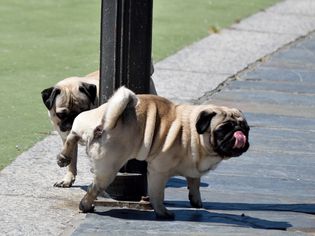
Why Do Dogs Lick Other Dogs' Pee?
Have you ever noticed your dog licking another dog's pee? Dogs are known to display plenty of odd b
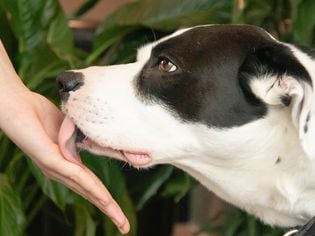
Why Do Dogs Lick You? 5 Common Reasons
Yes, dogs will lick you to show their affection—giving you kisses—but there are several other r
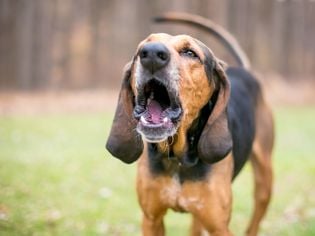
Why Does My Dog Bark At Everything?
Dogs bark for many reasons: to express how they’re feeling, to communicate crucial information, a

How to Train Your Dog to Stand and Stay
Training your dog to "stand" on command is very useful. This basic command is used to tell your dog
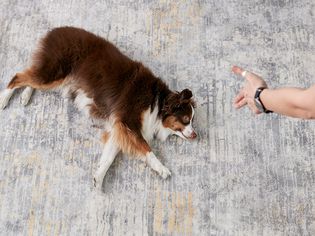
How to Teach Your Dog to Play Dead in 4 Steps
Playing dead is a great dog trick. While it's not as important as teaching your dog to obey com

How to Train a Labrador Retriever
Labrador retrievers regularly top the list of most popular dog breeds. These smart, social dogs are
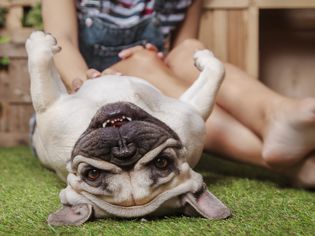
Why Dogs Like Being Pet
Most of us humans enjoy the occasional massage, but why is it that so many dogs enjoy, initiate, an
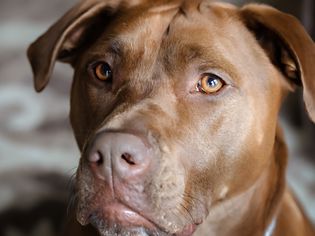
Can Dogs Eat Pickles?
Our pups might be fine after eating a couple slices, but dogs shouldn't eat pickles because the
About Ask a Paw
We are a premier digital platform committed to delivering high-quality content to our readers. Our mission is to provide accurate, reliable, and engaging information that adds value to our audience's daily lives.
Our team consists of experienced content creators and subject matter experts who uphold the highest standards of professionalism. In an era of information overload, we curate content with care, ensuring our users receive only the most relevant and trustworthy information.
Beyond just reporting facts, we focus on depth and context. Through expert analysis, comprehensive research, and clear presentation, we help our audience gain meaningful insights and make informed decisions.
We take pride in being a trusted information source for our growing community of readers. Our user-first approach means we continuously adapt to provide content that meets our audience's evolving needs and interests.
Innovation and excellence drive everything we do. We're committed to improving our platform and services to deliver the best possible experience for our users.


Comments on " How to Stop Your Puppy From Eating Everything" :